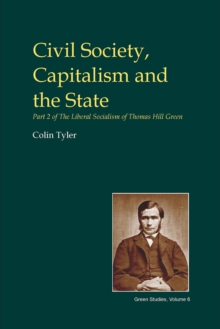
The Greenian Moment : T.H. Green, Religion and Political Argument in Victorian Britain PDF
by Denys P. Leighton
Part of the British Idealist Studies 3: Green series
Description
This study of T.H. Green views his philosophical opus through his public life and political commitments, and it uses biography as a lens through which to examine Victorian political culture and its moral climate.
The book deals with the political and religious history of Victorian Britain in examining the basis of Green's Liberal partisanship.
It demonstrates how his main ethical and political conceptions-his idea of "self-realisation" and his theory of individuality within community-were informed by evangelical theology, popular Protestantism and an idea of the English national consciousness as formed by religious conflict.
While the significance of Kantian and Hegelian elements in Green's thought is acknowledged, it is argued that "indigenous" qualities of Green's teachings resonated with values shared alike by elite and rank-and-file Liberals during the mid and late Victorian era.
In examining Green's beliefs about the historical evolution of English liberty, his championing of (Liberal) Nonconformity and Nonconformist causes and his approval of religious bases of community, this study analyzes the ripening of a Greenian moment and traces Green's influence on Liberal, quasi-socialist and Conservative social reform down to the 1920s.
The lasting impact of Green's teachings on British and Western political philosophy, apparent in the current vogue for communitarianism in liberal theory, indicates limitations of the "secularization thesis" still tacitly accepted by historians of Western political thought.
Information
-
Download - Immediately Available
- Format:PDF
- Pages:375 pages
- Publisher:Andrews UK
- Publication Date:30/11/2015
- Category:
- ISBN:9781845408756
Information
-
Download - Immediately Available
- Format:PDF
- Pages:375 pages
- Publisher:Andrews UK
- Publication Date:30/11/2015
- Category:
- ISBN:9781845408756










